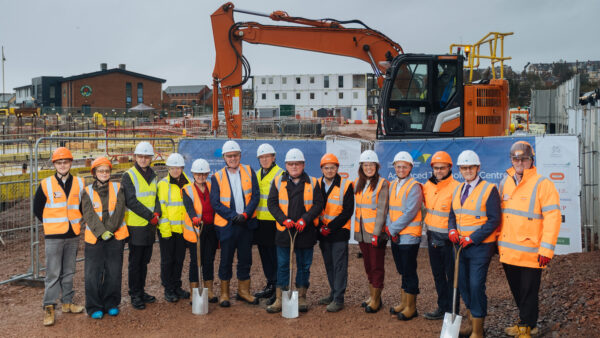
Christina Riley with Caitlyn Jenner at the LGBT Awards 2017
After 20 successful years in the industry, Christina Riley came out as a transwoman. Now she works hard to make sure her experience can benefit others in the industry. James Kenny reports.
Travelling into London in March 2014 Christina Riley knew her life was about to change forever. She was on her way to attending the first meeting of the lesbian, gay, bisexual and transgender (LGBT) network at Balfour Beatty, having finally made the decision she would come out as a transwoman.
For 20 years she had been known as Chris, forging a successful career in construction, beginning as a trainee engineer and working on high-profile projects such as the Olympic Village and Wimbledon. And also married and had two daughters.
Related articles
- Balfour planner wins LGBT Rising Star award
- How to build a rainbow coalition
- Mace’s LBGT plan is central to wellbeing
“When I entered that meeting I just stayed silent and listened to everyone else speak, but it was a safe space and I was determined and had made up my mind, no matter what happened. Afterwards I spoke to the HR person there and announced my intention to come out at work.”
With the help of Balfour Beatty, Riley was able to make a plan for the process of transitioning and, after speaking to her family and friends, she and her employers set a six-month date for her return to work as Christina. The Gender Identity Research and Education Society (GIRES) assisted with her transition.
Riley says that by and large she’s been accepted in the industry – though life has been anything but plain sailing. Her marriage broke down and it took a while to rebuild a relationship with her two daughters. Some friends also turned their backs on her.
But she says that being able to continue her career in such a male-dominated environment was a surprising relief: “The burden of carrying around the secret of being trans for so many years had a huge impact on my mental health. I would regularly suffer with severe panic attacks and felt like I couldn’t breathe,” she recalls.
CIOB backs new research into LGBT experience in the industry
As part of the research supported by the CIOB’s Bowen Jenkins fund, the experiences of the lesbian, gay bisexual and transgender (LGBT) community in construction are being explored by Dr Sarah Barnard and Professor Andrew Dainty from Loughborough University.
The project – LGBT in Construction: Exploring experiences to inform inclusive practices – explores LGBT experiences in construction in order to inform developments in employment practices in the sector.
The research will mobilise in-depth qualitative methods in order to develop an understanding of the range of experiences of LGBT workers – giving them a way of exploring their career narratives and reflecting on how being in a minority group may have impacted on professional development.
The data analysis will directly feed into recommendations to develop inclusive practices in the construction sector.
Since her transition, she has become co-chair of the LGBT network at Balfour Beatty, runs the LGBT Construct network on Twitter and is on the committee of the OffSite, interEngineering and #BuildingEquality industry networks.
She has also done work with the Considerate Constructors Scheme’s Best Practice Hub, promoting diversity and inclusion in the sector – all on top of her day job as a senior planner. Her efforts were rewarded in May when she was named winner of Corporate Rising Star at the prestigious British LGBT Awards 2017.
There’s clearly a great deal of work to be done. According to LGBT rights charity Stonewall and a survey conducted in 2016 with Construction News, Architects’ Journal and New Civil Engineer, more than 60% of LGBT employees working in the construction and property industry experienced homophobia/biphobia/transphobia in the past year, a figure that rises to over 80% for those who work on site.
Less than half said they trusted their line managers to handle sexual orientation issues, and just one in ten would recommend the industry to other LGBT colleagues.
“Construction needs to build an environment where people can feel comfortable and express themselves as they would be able to in other employment sectors,” says Riley.
Balfour Beatty is a Stonewall Diversity Champion, but it isn’t alone in trying to change attitudes. Lendlease, Arup, JLL and a number of legal firms (such as Dentons, featured on p32) have been working hard, setting up networks and working with Stonewall. Clients are also helping drive the agenda.
“Clients are more and more interested in diversity. At Balfour we are working with EDF Energy on Hinkley Point, who have their own LGBT network and have helped Thames Tideway launch their LGBT network,” she explains.
“With the skills shortage and Brexit looming we now more than ever need to attract and retain staff. There is a whole untapped pool of talent in the LGBT community that could be used,” she says.
“My main thing now is to see things link together. Separately, there are so many companies and organisations in construction doing lots of good work on behalf of the LGBT community. However, I think we now have to try and share resources. The message is we’re ready to change, but we need to work together to get where we need to be.”

Balfour Beatty’s LGBT group meets the BBC’s Evan Davis
Comments
Comments are closed.











Having worked for a firm of Architects that made redundant a member of staff after they found out he was transvestite, I would like to highlight that the approach the management took to the person (who ended up with a confidential settlement to head off a court case), ended up being an example of how little they cared for the rest of their employees, and how authoritarian the firm was becoming.
A further example of this attitude to staff, being how the management instituted without any consultation a policy that all parents must have “emergency childcare” arrangements in place, should they fall ill and not be able to attend school or nursery. It was when 2 women Architects with young children were both reprimanded for not adhering to this policy, that I decided it wasn’t the place for me either, and started to look for another job.
Accordingly, anyone who isn’t in the LGBT rainbow, should look at a firms policies…it may be revealing more than the firm wants to know.